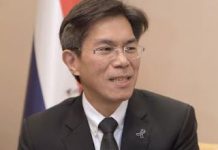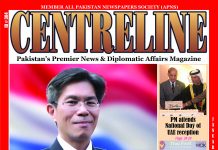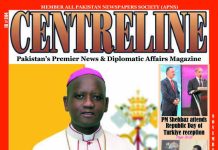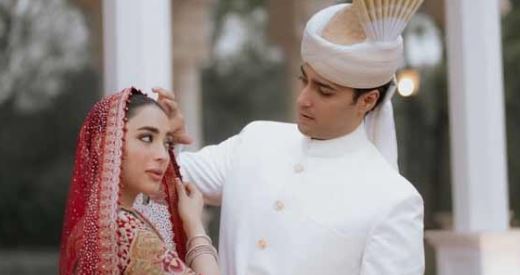SAID HINDAM
Revolution purely homegrown; Judiciary in Egypt is independent; military has no role in dissolution of parliament; relations with Pakistan growing at fast speed
Ansar Mahmood Bhatti
Mr. Said Hindam, Ambassador of Egypt to Pakistan gave an exclusive interview to Centreline and Diplomatic News Agency (DNA). During the interview the ambassador gave a detailed account of what was happening in Egypt after the revolution. He also talked about recent political changes in his country. Besides Pakistan-Egypt relations the ambassador also talked about regional as well Middle East politics. On Afghanistan and Kashmir too he gave an in-depth analysis. Here are excerpts from his interview for the interest of readers.
1: Let us begin with the Egyptian revolution. There is a perception as if the revolution is not home-grown. Even some would point finger towards certain Western powers. What is the actual position? Please also give us a brief account of factors that led to the revolution?
To speak about the Egyptian revolution we have to understand that this revolution started in 2004, the movement that led to this revolution is known as Kefaya, which means enough, stands for The Egyptian Movement for Change. It is very unfair at this point to deny the Egyptian people the success of their rightful struggle for freedom and democracy. Besides; the political monopoly of the national Democratic Party was the driving source of disenchantment for people therefore when the Movement for Change took its course, when young protesters went down on the street in Tahrir square, everybody put weight behind it.
Foreign Western powers have been preaching their models of democracy and respect of human rights including in Egypt; we did not remain indifferent to such call for humanitarian notions, we have believed in the respect of human rights, equality and democracy. We have been teaching human rights and democracy in our schools, to our policemen and judiciary, we have also worked hand in hand with the United States and Europe on various programmes to this end; having said that, one has to understand that the decision to reform the system in Egypt was our own. Western powers simply supported our efforts in implementation of that decision.
We have a neighborhood policy agreement with the European Union by which Europe would contribute in the financing of the Egyptian program for change including towards adopting human rights and democracy. This is a fact but we cannot say that Egyptian revolution was a sequel of any foreign intervention. It was purely homegrown revolution led and engineered by the people of Egypt.
Regarding your question about the recent political changes, I would say that Egypt now enjoys democracy and has become a democratic country; we have set the term for president to be four years renewable only once; Then Egyptians living abroad have been given the right to vote and above all we had free and fair elections under international supervision.
It is equally important to note that we have an independent Judiciary in Egypt and the Judiciary gave an independent decision when it was approached and prayed that this parliament is not constitutional; we have to accept the decision of the court. Let me share with you the information that the political parties of Egypt have hailed and accepted the court verdict. Now we have to wait for the date of new elections, which I think may take place in a few months time. In a nutshell we can say the Egyptian parliament stands dissolved and Egyptians would go for fresh elections, which will give us a chance to discover the real colors of Egypt.
Regarding the military council’s involvement in the court decision, no one can say that the military institution was behind the verdict of the court. As I told you before our courts are fully independent and please keep in mind it was not the military that brought the case to the court. My understanding is that the supreme military council would urge the need to have stability and democracy in the country.
2: Where does stand Egypt after the Revolution? Do you think it will bring further prosperity to the people of Egypt and a true democratic system will now be in place?
Your question has two elements; the economic prosperity and the democratic system. We should not tell the people that if they go for human rights and democracy they will have to sacrifice economic prosperity. This notion is not correct. As I just told you we have democracy in place; we had parliament and we will have new parliament soon. Our country surely is well on track in terms of economic growth. I can tell you all the factories in Egypt are fully in operation nowadays – a fact which you may check from the Pakistani investors in Egypt. The only thing which we are waiting for is the Constitution that is going to govern Egypt. The Constitution would decide shall we adopt the parliamentary or presidential system.
3: How would you characterize Pakistan-Egypt relations? Can you share with us your plans to further cement these relations?
Relations between Egypt and Pakistan are from cordial to excellent. We see Pakistan as the stabilizing factor in the security of the Eastern borders of the Arab nations. Secondly, Pakistan is an important player in the stability of the broader Middle East. Besides, we duly recognize Pakistan’s efforts in combating terrorism and it goes without saying that Pakistan has suffered a lot, especially in economic terms, in this war against terror.
When I arrived here, the biggest task in front of me was how to further cement relations between the two countries. We plan to increase the existing trade volume which currently stands at 250 million USD, which is quite low keeping in view depth of ties and economies of two countries.
I have been touring the entire country to meet with businessmen and representatives of various chambers with a view to convincing them to come to Egypt for trade and investment. Through your platform let me address the businessmen that they must go to Egypt and take part in various exhibitions held all year round. They should represent their country with high quality and reliable products because that is the only way a reasonable niche can be secured for Pakistani production in Egypt’s markets. I often tell the Pakistani businessmen that you will have to compete with China, India and Bangladesh and let me tell you these countries are coming up now with high quality products. On our side I managed to get Egypt’s approval to issue long term multiple entry visas for Pakistani businessmen to facilitate trade and exchange with their counterparts in Egypt; I hope that the Pakistani embassy in Cairo would be able to follow suit.
We know that Pakistan is suffering gas shortage but at the same time we know Pakistan has enormous reserves of gas. Pakistan can undoubtedly overcome its energy shortage or even excel in energy sector if reserves are correctly developed and explored. Egypt is ready to help Pakistan in energy sector as well and even has proposed some of the steps that we can take to bail Pakistan out. Wind energy is one such proposal and further negotiations with the Pakistani concerned parties are already under way.
Egyptian investments in Pakistan amount to nearly 4 billion USD and this volume can even go further up provided proper infrastructure is available for that. Likewise Pakistani investment in Egypt are also increasing especially in the textile sector many Pakistani businessmen have established some factories benefiting from Egypt’s access to the American, European, African and Arab markets.
Egypt is also helping Pakistan in agriculture sector and we have been giving training to Pakistanis on regular basis. The purpose of this training is to impart latest and modern training to agriculturists so that they could get more and more production. Similarly, in education sector the Egyptian contribution has been phenomenal. We are funding and supplying 36 university professors annually to the International Islamic University. We plan to increase this number. We know Pakistan is a rich country and a huge pool of talents for the labor market; accordingly Pakistanis have excelled in all fields at world level.
4: What in your view is the main reason of Egyptian, of for that matter other investors’ reluctance to invest in Pakistan?
The Egyptian investors, like all other investors would come only when they see business potential and in case of saturation in one field they would try to try muscles in another field. We have investments in the fields of cement, telecom, real estate development and infrastructure. Egyptian investments flow to Pakistan was slowed down a bit in recent past but that was only because of internal situation in Egypt. We have a group who had been negotiating for acquisition of a fertilizer company but then revolution broke out in Egypt and the process was stalled.
It is important to underline that providing a conducive business climate would bring more foreign investors to Pakistan. The more you are economically secure the more you would invest; so economic security indeed is the key to increased investments. Let me also point out that the cost of infrastructure in Pakistan is not cheap, prices of electricity coupled with electricity shortages render the production less competitive in the international markets; other incentives have to offset this. The capital is ready to come provided investors are given incentives. In Egypt when we decided to give boost to industry we gave all new factories 10 years exemption from taxes. I think similar incentives if given to those who intend to invest in Pakistan the return will be very high.
The good thing is that Pakistan parliament recently adopted the 18th amendment, which would surely help improve the governing system in the country and ease the business requirements procedure. When Egyptian investors came to Pakistan element of business potential was their major concern and attraction rather than governing system. All these companies who are working in Pakistan are here because they know they can make maximum of business potential available to them.
Pakistan has an excellence in surgical goods production, yet the Pakistani products come to Egypt via third countries with four or five times the prices. We should work to promote direct trade. We can also work strongly in the textile sector as well. Egypt is No 1 importer of meat and, if Pakistani meat production is increased, Egypt is willing to take it. Currently we import meat from Brazil, Australia, New Zealand, India, France, Sudan and Ethiopia. Pakistan will have to develop export capacity in this area where we can immediately start cooperation.
You may be surprised to know that we import a good quantity of fish from Pakistan and we are willing to increase this quantity. Likewise we want to import rikshaws from Pakistan because we have great demand, especially in the rural and far-flung areas. Rikshaws have the capacity to even enter the small streets and also consume less energy.
5: Both countries have a rich cultural heritage. Do you intend to use this common bond to further bring peoples of both countries closer?
As I told before our biggest cultural cooperation comes in the field of education and our enormous support to the Islamic University. 36 professors of course cost heavily to the Egyptian government but even then we are committed to enhance this number. I know, our cultural cooperation is not up to the mark and needs drastic improvements. Your country has a lot of talent and we intend to make optimum use of this talent by joining hands with the Pakistan government. We also intend to help and support translation of books of both countries. This activity will certainly enhance and strengthen cultural activities between the two countries.
The Egyptian professors working in the Islamic university are also translating books for Pakistani people.
6: Egypt happens to be an important member country of Arab League and the OIC. It is often said about both these organizations that they never rise to the occasion whenever the Muslim world is confronted with problems. What is your take on this? Do you think both these bodies need to be reformed?
Please allow me to disagree with your question. Both organizations i.e the Arab League and the OIC reflect the will and attitude of member states. First, the Arab League has created a lot for Arabs. It is working on an Arab common market. Arab League has been doing an active role in bringing the Arab nations even closer in matters of labor policy, science, education and technology. As you know the AL has done a lot on the Middle East issue on the political arena by proposing the Arab peace initiative, and continues to play central role including its current role in the Syrian crisis.
Regarding performance of the OIC, I would suggest you to visit the COMSTECH here in Islamabad and see with your own eyes what the Islamic countries are doing together in the field of science and technology. Politics indeed is an important sphere, which cannot be overlooked therefore the OIC is doing its best in this field as well.
7: Can you share with us the Egyptian stand on the Kashmir issue? Moreover how do you see ongoing talks process between India and Pakistan. Do you think, it will ultimately lead them to resolve outstanding issues such as Kashmir?
Pakistan India relations have been developing so positively that you have gained appraisal of the whole world. The pace with which both sides are moving forward is satisfactory. Once I asked the Pakistani official why don’t you accelerate the pace and I was told ‘we are moving at a right pace’. On Kashmir we have same position what both Pakistan and India have agreed in the UN. We support the UN resolution that says, “Accession to Jammu and Kashmir to India or Pakistan should be decided through plebiscite”. I am a true believer in peace. Let me tell you, Egypt got its territories from Israel through peaceful means and not through war. I think the human capacity for negotiating peace can always do much better. Time of wars is over now and I am sure both sides have a clear understanding of this fact therefore they are on the path to resolve this issue through confidence building and peaceful means.
8: Afghanistan continues to be the hot spot and nobody knows, what exactly would be the solution of the problem. How do you see situation in Afghanistan and role of the neighbouring countries in bringing peace and stability there?
Afghanistan still remains an unresolved issue. After the Chicago summit one can say the international community genuinely wants to withdraw from Afghanistan. We have to achieve reconciliation in Afghanistan. For Pakistan, Afghanistan happens to be a vital foreign policy element. Pakistan is immediately touched by any instability in Afghanistan and we cannot see stability in this region without the stability in Afghanistan therefore everybody needs to work hand in hand to achieve stabilization in the region. Egypt is supporting Afghanistan in various areas such as education, police and diplomacy training etc. Likewise we are also involved in institutional building capacity besides focusing much attention on infrastructure development.
Of course reconciliation means taking all factions on board and not excluding any party; Pakistan can play a leading role in this regard. Regional projects would be a leading reconciliation and stability factor; to this end, TAPI pipeline would bring the participating countries even closer.
9: Any thing you would like to add?
Pakistan is very beautiful country with huge potential in all fields. It has all the ingredients, which may take you to heights of economic development and prosperity. Then there is wide scope in tourism as well. Unfortunately this sector is yet to be developed. Let me tell you there is huge potential in the tourism sector and if developed properly, this sector can contribute heavily to the national exchequer of Pakistan.











